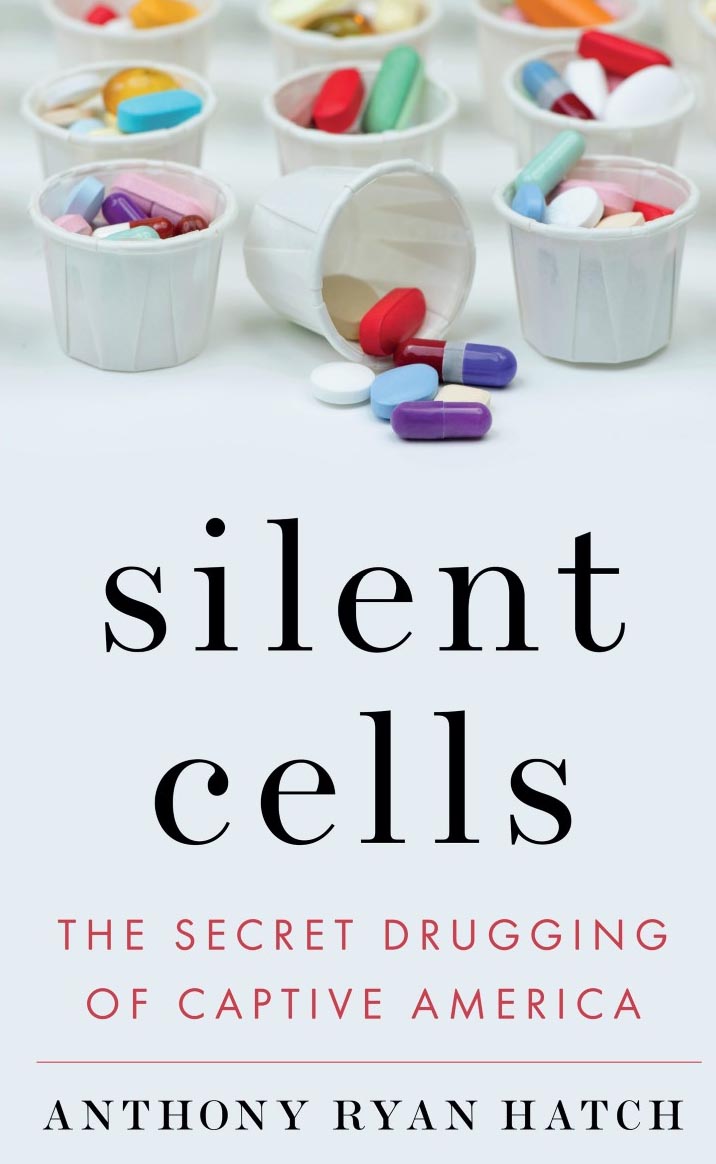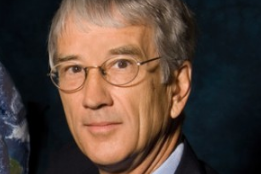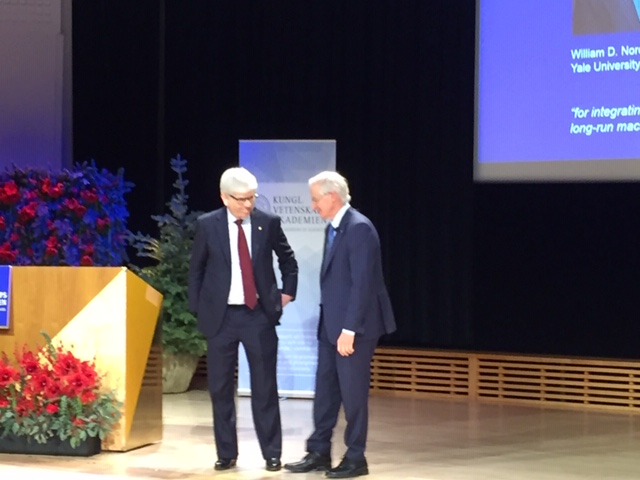In this recurring feature in The Wesleyan Connection, we highlight some of the latest news stories about Wesleyan and our alumni. Wesleyan in the News The Hill: "Advice on Climate Policy for the 2020 Presidential Candidates" In this op-ed, Huffington Foundation Professor of Economics and Environmental Studies, Emeritus Gary Yohe and his coauthors write that they are encouraged by the "unprecedented attention being given to climate change among those vying for the 2020 Democratic presidential nomination" and offer words of advice for creating an ambitious but credible climate policy. 2. AINT — BAD: "Isabella Convertino" The photography of Isabella Convertino '20…
Although dam removal is an increasingly common stream restoration tool, it may also represent a major disturbance to rivers that can have varied impacts on environmental conditions and aquatic biota. In a paper titled "Dam Removal Effects on Benthic Macroinvertebrate Dynamics: A New England Stream Case Study, five researchers from Wesleyan examined the effects of dam removal on the structure, function, and composition of benthic macroinvertebrate (BMI) communities in a temperate New England stream. The benthic—or "bottom-dwelling”—macroinvertebrates are small aquatic animals that are commonly used to study biological conditions of water bodies. The paper is published in the May 21…
Associate Professor of Science in Society Anthony Ryan Hatch is the author of a new book, Silent Cells: The Secret Drugging of Captive America, published on April 30 by University of Minnesota Press. The book is a critical investigation into the use of psychotropic drugs to pacify and control inmates and other captives in the vast U.S. prison, military, and welfare systems. According to the publisher: "For at least four decades, U.S. prisons and jails have aggressively turned to psychotropic drugs—antidepressants, antipsychotics, sedatives, and tranquilizers—to silence inmates, whether or not they have been diagnosed with mental illnesses. In Silent Cells, Anthony Ryan…
Wesleyan faculty frequently publish articles based on their scholarship in The Conversation US, a nonprofit news organization with the tagline, “Academic rigor, journalistic flair.” In a new article, Huffington Foundation Professor of Economics and Environmental Studies Gary Yohe writes about the economic costs of climate change, which he argues will hit our economy much sooner than many people realize. The economic cost of devastating hurricanes and other extreme weather events is even worse than we thought June marks the official start of hurricane season. If recent history is any guide, it will prove to be another destructive year thanks to the worsening…
Shayna Beaumont ’19, an environmental studies and Hispanic literatures and cultures double major from New York, has been selected as a finalist in Map the System, a global competition that asks participants to research the ecosystem of an issue they care about. Her project, “Food Justice as a Platform for Environmental Equality in Harlem” tackles the issue of food deserts in the neighborhoods of East and Central Harlem in New York City. "All my life I’ve grown up in food deserts where the unhealthy fast food chains and liquor stores are advertised, instead of healthy eating," she said in a Coexistdaily blog.…
In this recurring feature in The Wesleyan Connection, we highlight some of the latest news stories about Wesleyan and our alumni. Recent Wesleyan News Gizmodo: "What's the Oldest Disease?" Douglas Charles, professor of anthropology, professor of archaeology, says "we don't know" the answer to this question because of limitations in fossil records. However, he says that there are indications of tuberculosis, leprosy and tumors found in ancient human and Homo erectus skeletons. The Middletown Press: "Wesleyan University to Move 90 Employees to Main Street Middletown" Wesleyan's University Relations staff and most Finance staff will move to the Main Street building as…
Wesleyan faculty frequently publish articles based on their scholarship in The Conversation US, a nonprofit news organization with the tagline, “Academic rigor, journalistic flair.” In a new article, Associate Professor of History Jennifer Tucker explores our ongoing romance with the gas lamp in connection with the new Mary Poppins film. Tucker is also associate professor and chair, feminist, gender, and sexuality studies; associate professor, science in society; and associate professor, environmental studies. In 'Mary Poppins Returns,' an ode to the gas lamp “Mary Poppins Returns” transports audiences back to 1930s London. The beloved nanny at the center of the original 1964…
In this recurring feature in The Wesleyan Connection, we highlight some of the latest news stories about Wesleyan and our alumni. Recent Wesleyan News 1. Los Angeles Times: "As the World Warms, Deadly and Disfiguring Tropical Diseases Are Inching Their Way Toward the U.S." In this op-ed, Professor of Biology Frederick Cohan and Isaac Klimasmith '20, both in the College of the Environment, write that infectious disease is a growing threat, resulting from climate change, that humans may find hard to ignore. Cohan is also professor, environmental studies and professor, integrative sciences. 2. Hartford Courant: "Trump's Immoral Response to Climate Report" Gary Yohe, the…
Gary Yohe, the Huffington Foundation Professor of Economics and Environmental Studies, attended the 2018 Nobel Week in Stockholm, Sweden, Dec. 7–11, as a guest of William Nordhaus, the Yale University professor of economics who received this year’s Sveriges Riksbank Prize in Economic Sciences in Memory of Alfred Nobel. Nordhaus was recognized for his work “integrating climate change into long-run macroeconomic analysis.” Nordhaus was Yohe’s dissertation advisor at Yale and inspired Yohe’s own decades-long career studying the economics of climate change. Yohe himself received a share of the 2007 Nobel Peace Prize for his work with the Intergovernmental Panel on Climate…
In this recurring feature in The Wesleyan Connection, we highlight some of the latest news stories about Wesleyan and our alumni. Recent Wesleyan News The Washington Post: "Major Trump Administration Climate Report Says Damage is 'Intensifying Across the Country'" Gary Yohe, the Huffington Foundation Professor of Economics and Environmental Studies, was widely quoted in the media about the fourth National Climate Assessment, the first to be released under the Trump Administration. "The impacts we’ve seen the last 15 years have continued to get stronger, and that will only continue,” Yohe, who served on the National Academy of Sciences panel that…
Barry Chernoff, director of the College of the Environment, was one of eight scientists recently honored with a new musical composition based upon his research—part of a concert and album titled "The Sound of Science, performed in New York City on Nov. 10. The project aims to build "bridges between the musical and scientific worlds, celebrating their shared culture of inquiry," according to the website. The pieces were written by seven celebrated composers for amplified cello and electronics, and were all recorded and performed by world-renowned cellist Jeffrey Zeigler, longtime member of Kronos Quartet and several other groups. The Grammy…
Wesleyan faculty frequently publish articles based on their scholarship in The Conversation US, a nonprofit news organization with the tagline, “Academic rigor, journalistic flair.” In a new article, Professor of Government Mary Alice Haddad writes that the recent election of many pro-environment mayors was a promising sign for our country's response to climate change. She describes the progress that cities in the U.S.—and around the world—have made in this area in recent years, at a time when the federal government is moving backwards. Haddad is also professor, environmental studies, and professor, East Asian studies. Americans elected mayors who care about climate change…







